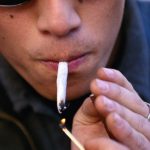There may be new meaning to the term “higher” education: College has become a major setting for first-time pot use, new research contends.
Undergrads are experimenting with marijuana in record numbers. And those who never tried pot are 51 percent more likely to experiment with the drug while on campus than those who don’t go to college, said study author Richard Miech. He’s a research professor with the University of Michigan’s Institute for Social Research.
College students were 17 percent to 22 percent more likely to try pot for the first time than those who did not get a higher education from the 1970s through the 2000s, according to the study.
“First-time marijuana use is at the highest level in college students than it has been in three decades,” Miech said.
“These days if you’re in college, about 1 in 5 students will become first-time marijuana users. If you don’t go to college, your chances are more like 1 in 10,” he said.
Miech and his colleagues based their findings on data from an ongoing survey of American students and young adults funded by the U.S. National Institute on Drug Abuse.
The researchers used data from the survey between 1977 and 2015 to analyze young adults 19 to 22 who never used marijuana in high school, comparing college kids against those who didn’t continue their education.
The researchers found that college has been steadily increasing as the place for first-time marijuana use.
The researchers have a couple of theories why college kids are more likely to experiment with pot these days.
“We find that college seems to promote substance abuse, like binge drinking,” Miech said. “Binge drinking is much more common among college students than their same-age peers.”
The trend of marijuana legalization also likely has increased college students’ interest in trying pot, he added.
“I think they are sending a signal to everybody that marijuana is safe,” Miech said. “It’s like alcohol, without the hangover.”
However, high school marijuana use has been on decline since states began legalizing pot, said Miech and Sean Clarkin, executive vice president of research and external relations for the Partnership for Drug-Free Kids.
“What I’m tempted to infer from this is that what may be happening is that kids are starting marijuana use later,” holding off until college experimentation that might have taken place in high school during previous decades, Clarkin said.
Miech and Clarkin have different takes on what might be causing this delay.
Clarkin thinks that marijuana legalization has been accompanied by an increased emphasis on keeping pot out of the hands of teenagers.
“At the same time legalization has become more prevalent, there may be a greater watchfulness on the part of parents and educators and public health officials,” he said.
On the other hand, there’s also been a substantial decline in cigarette smoking and drinking among high school students, Miech noted.
Since marijuana use tends to go hand-in-hand with these other pursuits, public health efforts to stop teen smoking and drinking might also be driving down pot use in that age group, the researchers said.
Clarkin suggests that parents have a heart-to-heart with their college-bound kids regarding marijuana use.
“Parents have to say, ‘Look, you’re trying to get a college degree in one of the most competitive environments in living memory. Smoking up every day may not be helping you. While you’re trying to get through a critical period of your life and your education, be smart about this,’ “Clarkin said.
These talks should include anecdotes from either the parents’ own lives or the lives of friends and relatives, where marijuana use did not help the person involved, Miech said.
“I think those kind of stories have a substantial impact on kids going to college,” Miech said.
The study was published online April 20 in the American Journal of Public Health.
More information
For more on college-age drug use, visit the U.S. National Institute on Drug Abuse.
Source: HealthDay
Copyright © 2026 HealthDay. All rights reserved.
















